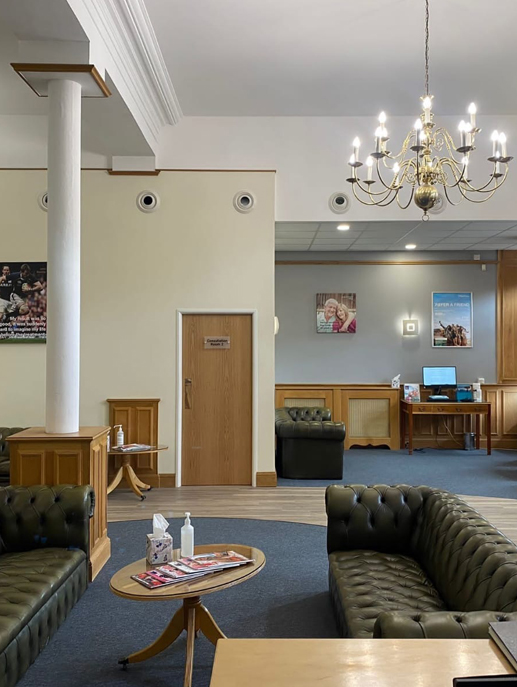Reach Us
Book An Appointment
Please fill out the form below to connect with one of our advisors and start your booking process. They will call to discuss your visual requirements and finalise the appointment booking.

Lens surgery, also known as refractive lens exchange or lens replacement surgery, is a procedure aimed at correcting vision problems caused by the natural aging process or certain eye conditions.
This procedure is commonly used to treat conditions such as presbyopia, cataracts, and extreme farsightedness or nearsightedness. It's typically performed on an outpatient basis and has a high success rate, offering patients a clearer vision and improved quality of life.
The term ‘lens surgery’ covers three separate treatments: refractive lens exchange RLE (also known as lens replacement surgery), cataract surgery and implantable contact lenses (ICL).
All these treatments involve the insertion of an artificial lens, known as an intraocular lens because it is placed inside the eye (commonly abbreviated as IOL). These treatments can correct myopia, hyperopia and astigmatism.
ICL surgery simply involves placing an artificial contact lens into your eye to correct your prescription. It is generally recommended for patients who are under the age of 40.
There are many types of lenses which suit different people, depending on your lifestyle and prescription. At Optimax, we offer a range of monofocal, multifocal or trifocal lenses. These allow you to have sharp vision for multiple distances, often eliminating the need for reading glasses. During your consultation, the best lenses and your options are explained to you. Some complex lenses can be custom-made for you at an additional cost.
Lens surgery tends to be suitable for patients who are over the age of 40, but please note that we will not perform the operation on anyone who is pregnant or breastfeeding, as the fluctuating hormones can affect your vision. There are also a number of other factors which may affect your eligibility for lens replacement surgery, such as the strength of your prescription, your pupil size, corneal thickness and any dryness of the eyes.
Which prescriptions can lens surgery correct?
After your treatment we will provide you with medication drops to reduce discomfort, and help with the healing process. We offer up to one year of free aftercare, which includes a number of appointments as we continue to check on your progress and recovery. Your first visit will take place a day or two after the procedure, with another scheduled in for a week or so later. We’ll also ask you to come back in around 4-6 weeks down the line and, if everything seems satisfactory, you will be discharged after 3-6 months.

We are recognised providers of cataract surgery for several Private Health Insurance Companies. Please let us know as soon as possible if you think this may be relevant to you and always check with your insurance provider before arranging any treatment.
Below you’ll find answers to some of the most common questions we receive. We are constantly keeping track of what information our patients are interested in and aim to provide it in the simplest form possible. If you cannot find the answers you are looking for within this section, please don't hesitate to get in touch with one of our advisors who are on standby to discuss your visual requirements and respond to your queries.
The surgery itself usually takes between 10 to 15 minutes, although you should prepare to be in the treatment room for up to half an hour, and in the clinic on the day for up to four hours.
The process of RLE (Refractive Lens Exchange) treatment is the same as the method for cataract treatment. The ageing natural lens is removed and is then replaced with either a monofocal or multifocal lens. With ICL (Implantable Contact Lens) procedures, the natural lens remains inside the eye, and an artificial lens is implanted in front of it. As the natural lens isn’t removed for ICL treatment, the procedure is entirely reversible.
The lenses do not break down inside the eye – they’re made to last for around a hundred years – so deterioration isn’t something you need to worry about.
Your vision is likely to be a little blurry for 2-3 days following the procedure, and will gradually improve over the coming weeks. It depends on your line of work, however most people can go back to work after a couple of days. Some patients need up to a week off, but it depends on your individual recovery process.
Again, this depends on how quickly your eyes heal. This can be a matter of a couple of days, or a couple of weeks. As you’ll be coming back in to the clinic for aftercare and follow-up appointments, the optometrist should confirm then when you are back to driving standard.
We recommend avoiding rigorous exercise for one month following the procedure. This is because it can increase the eye pressure and affect the healing process. You should avoid water sports for a month as water carries bacteria and could trigger an infection in your eye. Similarly, you should protect your eyes from sweat by wearing a headband during sports activities for at least two weeks. Full details of resuming sports can be found in your aftercare advice guide given to you by your clinic.
You might experience an increase in halos or glare at night following the procedure. It is caused by light reflecting off the rim of the lens, so as your pupils become larger in the dark, the reflections become more obvious. This reaction to glare should gradually decrease with time. However, it may remain for some time for some patients, especially those with large pupils.
For ICL treatment, we like our patients to be between the ages of 21 and 40. Patients younger than 21 often have eyes which are still developing and changing, and a stable prescription is needed to ensure that the right lens is being implanted. After the age of 40, patients often develop the need for reading glasses, and in that case may be more suitable for RLE treatment. There is no upper age limit for RLE, especially as it is also used to treat cataracts which typically begin to affect people later in life.
If you wish to eliminate the need for reading glasses, you should consider RLE with multifocal lenses. These will allow you to focus your eyes on objects at multiple distances, regaining younger vision and improving near vision for tasks such as computer use or reading.
We can perform bilateral procedures (both eyes treated on the same day, one after the other) but this will need to be discussed with your treating surgeon. If you prefer, you can also have your eyes treated separately, a week apart, diary permitting.
Please fill out the form below to connect with one of our advisors and start your booking process. They will call to discuss your visual requirements and finalise the appointment booking.